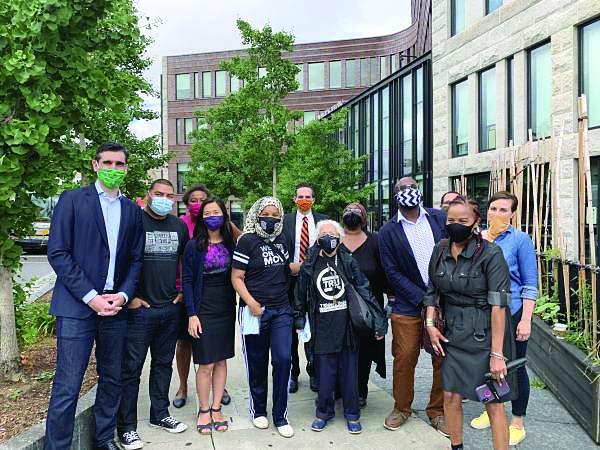July 9, 2020

A group of transit advocates and elected officials gathered after a press conference in Roxbury’s Nubian Square last Thursday, July 2. Katie Trojano photo
Transportation advocates and their political allies renewed calls for dramatic reforms to the MBTA system— with a specific emphasis on “unfair fares”— during an event in Roxbury’s Nubian Square on July 1 attended by City Council President Kim Janey, Councillor-at-Large Michelle Wu, state Rep. Nika Elugardo, and leaders from advocacy groups, including the Fairmount-Indigo Transit Coalition.
“Last year we had volunteers come together to cover every single rapid transit station on the MBTA to demand action and change for transit justice,” said Wu. “On the one-year anniversary, we’re coming together as leaders and community activists, and elected officials to renew the call for action for transit justice.”
Specific initiatives outlined by Wu and others include a call to maintain rear-door boarding on buses with no fare collection; the adoption of a “means-tested” MBTA fare system-wide; decriminalization of fare collection; commuter rail electrification and fare equity; and better bus facilities.
“Since [last year] it is clear that this has grown into a movement,” said Janey, who called it a “racial justice issue and an economic justice issue. I know what it means to take the bus, but I do have options and choices as a city councillor that most of the people in my district don’t,” she added. “What COVID has shown us is we can have free buses. Let me be really clear: I’m not looking for fare reductions, I want to see free buses on certain bus lines. We can’t continue to think about public transit as a way to bring in folks from the suburbs. We have to take care of the residents right here in our city.”
Mela Miles, lead organizer for the Greater Four Corners Action Coalition and chairwoman of the Fairmount-Indigo Transit Coalition, said that impacts from the virus underlined the need for more action.
“A lot of people have lost their jobs and last year the unfair hikes were one issue, but today the issue is exacerbated because of people’s loss of jobs and the issues of crowding that took place during the outbreak,” she said.
Miles said activists have asked MBTA General Manager Steve Poftak to update and enhance the technology for the bus system’s sanitizing air conditioners to promote respiratory health.
She also gave credit to the MBTA for launching a new pilot program on the Fairmount Line. Starting July 22, eight additional trains per weekday will be been added to the line, which connects Readville to South Station, increasing frequency and convenience for commuters.
“This speeds up the opportunity for people to have to get from point A to point B without having to sit on crowded busses.” said Miles.
As part of the year-long pilot program, T riders can also now use CharlieCard to ride the Fairmount Line. The T has installed “validators” on all Zone 1A station platforms — which includes all of the ones in Dorchester and Mattapan.
“Advocates have been working for over 15 years to get the MBTA to allow the use of the CharlieCards on the Fairmount Line that runs through the majority of Black and Brown communities,” said Miles. Still, she said, more investments in transportation need to be made.
“Our transportation system is the lifeline for our community to get to their jobs, to get to everything that they need to do and we don’t have the option to just go find some other way to get around,” she said. “So, we have to have more buses out here, we need cleaner greener buses for our respiratory health, more affordability and we’re asking for the MBTA to make sure the buses are safe to ride on as people come back in greater numbers.”
Stacy Thompson, executive director of LiveableStreets Alliance, said, “It is our moral obligation to make sure that people have safe, affordable, and reliable access to transportation. My key message today is when you hear things like ‘clean buses’ and ‘better service’ that’s not crazy or insurmountable. These are reasonable, achievable solutions that both the Legislature and the MBTA have the ability to act on right now.”
She added: “The MBTA could make the choice to just allow all door boarding. That is a choice that doesn’t require technology, doesn’t require a vote. It’s a choice they could make today.”
Thompson noted that legislators have “pushed through a revenue package” that the Senate “must act” on.
Elugardo, who represents the 15th Suffolk/Norfolk District, pointed to two bills passed by the House— a transportation bond bill and transportation revenue bill— that are awaiting Senate approval.
“In urban communities across the state, people of color are taking public transit and buses at a rate 50 percent higher, and getting worse, less frequent, asthma-inducing service,” Elugardo said. “Free buses is possible fiscally...if we want to increase the revenues in our state we need to make sure that everybody has equal access to work, housing, and to being healthy.”
Jarred Johnson, executive director of Transit Matters, said that the pandemic has “turned the world upside down” for essential workers that rely on public transit.
“We need to honor those workers that we’ve been clapping for and waving signs for,” he said. “What would be a disgrace is for us to go back to terrible traffic because we’re not investing in public transit.”
Chris Dempsey, executive director of Transportation for Massachusetts Advocacy Coalition, called for Senate action to invest in transportation immediately.
“My message today is very simple and very clear: the Massachusetts State Senate must act.”


